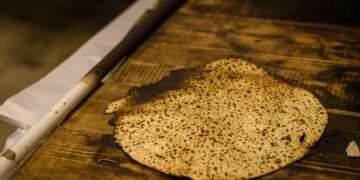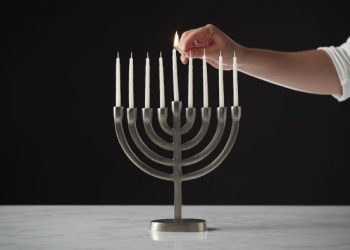Buyers Guide To Oil, Candles, & Wicks For The Menorah [#68]
Listen/Download Audio
Watch This Video And More At
Today we're going to try and give a quick buyer's guide to olive oil, candles, and wicks, for this Chanukah and all upcoming Chanukahs. We're using sefarim called Kitzur Halachos Chanukah and Purim, by Rav Zev Hofstedter, the Chukei Hachaim Parsha Sheets, by Rav Chaim Bleier, as well as material from dinonline.org.
The base halacha is that all oil, wicks, and candles are permissible to be used for Chanukah. The best types of wicks that a person can buy/use are linen wicks and cotton wicks, as they produce a nicer flame. When it comes to oil, olive oil is the best type of oil that a person can use. It precedes wax candles. As well, a person who doesn't have olive oil, other oils are still better than wax, and he should look for an oil that produces a clear flame. Even though we're saying that it's better than wax, many people use wax. It's perfectly l'chatchilah, perfectly fine, to use wax candles.
How much oil does a person need? How much does he need to buy, or how much wax does there have to be for lighting? It depends on when the person is lighting. Most people light after shki'ah and indoors. In such a case, a person must have, at the time of lighting, enough oil or wax being lit to last for 30 minutes after lighting. In a case where it will not, then it's not going to be enough and he will not have fulfilled his obligation. A person has to look ahead and make sure they have that much oil at the time of lighting, (and buy earlier that much oil).
When a person is going to be lighting outdoors, then the halacha is going to be different. I'm not getting into that, as the amount of oil may be different. Speak to a rav about such a case. But even when lighting outdoors, its still best to have for 30 mins as well (when lighting after shkia).
On erev Shabbos, everybody lights before Shki'ah, after plag haMinchah, since we don't light after shki'ah because it's already Shabbos. In that case, it is not enough to have 30 minutes of flame or oil to last until half an hour after shki'ah. In a case where we light after plag haMinchah, before shki'ah, you must have enough oil or enough wax at the time of lighting that will last until half an hour after tzeis hakochavim, which is later than shki'ah. Tzeis hakochavim is at the fall of three stars. It will need to last 30 minutes after that, however you personally calculate tzeis hakochavim for Chanukah lighting.
When it comes to types of oils, the best type of oil, as we said, is olive oil. Within olive oils, there are poskim who say that it is better to use edible oil, as that mimics the oil of the Beis HaMikdash. Again, that's not fully necessary. It's just a good thing if a person can get that. As well, on top of that, cold pressed olive oil is even closer to the type of oil that was used in the Beis HaMikdash. Therefore, a person who is trying to get close to that, should use that type. However, poskim say that it's not entirely necessary and a person doesn't have to go out of his way too much to get that type of oil. It's just good if they have it according to those poskim.
Now, in regards to congealed olive oil, oil that's solidified, the question is if that's considered good olive oil or not l'chatchilah to be used. There's a debate among the poskim, and therefore it's best to liquified (liquid) olive oil in such a case, better than the solidified olive oil that is congealed.
When it comes to shmittah oil (oil that is produced from produce of the seventh year of the shmitah cycle), Rav Vosner says that it's better a person does not use that type of oil. A person who needs to use that type of oil should speak to their Rabbi.
When it comes to general olive oils that come from Eretz Yisrael, it must have a hechsher, because they need to have had taken terumos and ma'asros off. Therefore, it must have a hechsher. As well, if a person knows that the oil they are using has a mixture of basar v'chalav or it's from orlah, then it would also be asur to use, because that is asur b'hana'ah, it's forbidden to get pleasure from those types of oils.
When it comes to scented candles, someone who wants to use scented candles to light his menorah, we know you're not allowed to get benefit from the candles, so Rav Vosner says as long as you're just lighting them because you need the candles for the mitzva, and not because of the scent, then it would be okay. But if a person is using them because he wants the scent/aroma, then it would not be allowed to use such candles.
Now, what we spoke about earlier, with lighting the candles on erev Shabbos, some candles/wicks are not allowed to be used for Shabbos, because we're worried that you're going to tilt the oil in those types of oils/wicks (because they don’t produce the best light). Therefore, some oils/wicks are not allowed to be used on Shabbos. Therefore, even though we said all oils/wicks are allowed to be used for regular Chanukah weekday nights, when it comes to Shabbos, when you might tilt it, it's going to be a question. The regular menorah candles/wicks, we're not going to come to use them because their benefit is totally forbidden/asur lehishtamesh bahem, because it's Chanukah. But the shamash, which is allowed to be used, we're worried that you might tilt it after Shabbos starts. Therefore, the oil/wicks used for the shamash should be of those which are permissible to be used as Shabbos candles. (As well, they say that if the flames will burn for more than the 30 mins after tzes hakochavim, one should use permissible oil/wicks of Shabbos for all of them [not just shamash] since it is technically permitted to benefit from the light of the Chanukah candles after that time).
*Please note that these halachos are intended to inform and educate the reader/listener in general. For any specific questions which arise, it is recommended to speak over the exact case with a competent halachic authority in order to assess the halacha accordingly. You can send your questions in to us as well by replying via WhatsApp to our halacha Q & A number on the group, sending an email to Ask@MoneyHalacha.com, or via our contact page at MoneyHalacha.com/contact-us
___________________________________________________________________________
Transcription Provided By: E-mail: transcriptionlm@gmail.com Tel: +972-53-986-0645








